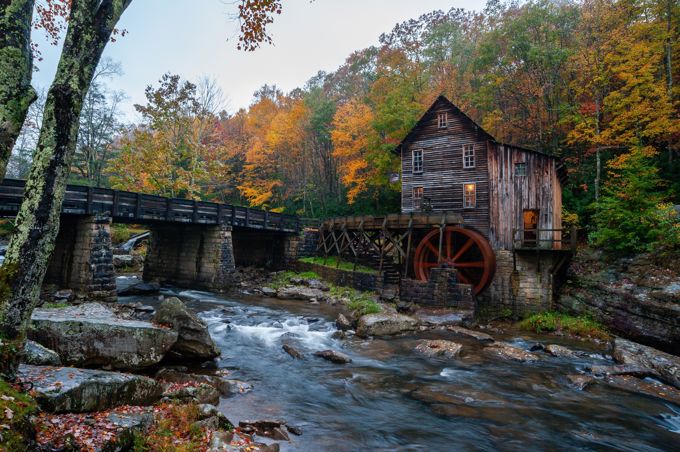In addition to contacting our experienced team, here's what property owners need to know:
Factors Impacting Creek Ownership in Virginia
Virginia laws and regulations separate the ownership of the bottomland from the right to access and travel through the waterway.
Let's unpack three of the elements a lawyer will consider when answering your question about creek ownership:
- Navigability
- Deed
- Riparian Rights
Navigability
Is the waterway deep enough for a ship or small vessel to navigate it?
Believe it or not, the Commonwealth does not define specific depths or widths for a waterway to be considered navigable - it's a gray area up to interpretation based on a variety of nuanced points.
Many factors, including if there is a history of the creek on your property being utilized for transportation / commercial purposes, will help an attorney answer the question of navigability.
This comes as a surprise to many waterfront property owners...
With few exceptions (usually related to there being a King's Grant in the chain of title), the beds of navigable creeks are held in trust by the Commonwealth for public use. In contrast, non-navigable creeks in Virginia are privately owned.
Your deed, alone, does not give you ownership or control of a navigable creek - which is why an appropriate legal determination is critical if you want to establish and defend your property rights.
While we're on the subject, you may be interested in learning how colonial Virginia property law still plays a role in determining this sticky issue.
What is a deed and how does it impact creek ownership?
A deed is a legal document that transfers ownership of real estate from one party (the grantor) to another (the grantee). The description of the property, transaction history, along with any covenants play an important role in determining what rights the grantee has upon taking possession.
Another shock many waterfront property owners find out too late that portions of the property were separated during prior real estate transactions, or specific permissions were given to a neighbor who wanted to build a pier or alter the adjoining waterfront.
This could mean that even though your property has a creek running through it, someone else has the legal right to alter your waterfront view or utilize the creek for things like duck hunting with the installation of a duck blind.
Before purchasing waterfront property, have an experienced waterfront property attorney perform a title search - digging into the deed's history, tax records and associated court documents.
You need to know that you're going to receive precisely what you believe you are purchasing at closing.
Get Expert Legal HelpRiparian Rights: The Commonwealth's Water Rights Doctrine
I've previously covered Virginia Riparian Property Rights in great detail. I encourage you to take a moment and read it if you're unfamiliar with the term.
It directly impacts your ability to access the water from your property, install / modify structures (piers, docks, etc.) and outlines one of the ways your property could naturally expand - known as accretion. Again, all of this is covered in more detail in the article linked above.
As a waterfront property owner, you need to understand how the framework of your property rights change once you transition from land to water. A creek may flow through your property, but how do you know if it belongs to you, or the state of Virginia?
If the bottomland is state-owned and if you have the funds, it may be worth completing a riparian survey to better understand the riparian zone that you control, in comparison to your neighbors. This involves taking measurements along the waterfront, as well as the depths of the creek at various points to determine your riparian boundaries.
Recap: 3 Factors Impacting Creek Ownership
Above, I've outlined the importance of determining navigability, the content and history of the deed for the property with a creek, as well as establishing a legally defensible riparian zone.
There are additional elements and every situation is unique. Understanding the above will help you save time and money when working with an experienced waterfront lawyer to ascertain the best legal advice possible in Virginia.

Long Creek Residential Property - Virginia Beach, VA
Shutterstock: Daniel Hogan
If I do own a creek, what am I allowed to do with it?
Once you legally establish ownership of a non-navigable creek, do you have unlimited rights to modify it as you see fit?
No. The Commonwealth of Virginia, as well as the Federal Government, have strict guidelines to protect the environment that we all share and enjoy.
Here are some things you're not allowed to do:
- Significantly or entirely divert the creek's waterflow
- Pollute the creek (i.e. dumping chemical or other harmful waste)
- Prevent your neighbors from utilizing their portion of the creek
The good news is that once ownership is established, with clearly-defined riparian boundaries, you are allowed to install, or prevent the installation, of piers, docks and other waterfront structures.
You're paying a premium for that beautiful waterfront view. It's worth protecting.
We Can Help Protect Your RightsWhy is defining ownership of a creek so important?
Creeks usually enhance the value of a property. Of course, this is tied to desirability, which will become incredibly important if you choose to market your waterfront property for sale, or use it as collateral to fund another project.
Creeks with poorly defined ownership also often lead to disputes between neighbors. Our phones ring all the time because a property owner discovered stakes in the water they thought they owned - only to learn that their neighbor is installing a structure that will obstruct their view.
We can mount a defense to stop or continue construction, but if the creek's ownership is poorly defined, we'll need to address that first. This involves a battle in Virginia Circuit Court. Each side will have the opportunity to present evidence (hopefully including a thorough riparian survey).
If funds are tight, we can utilize our relationships and time-tested strategies to give you the best possible chance of getting the outcome you desire.
In these situations, it's important to give us a call ASAP.
Don't forget that living on the water, which includes owning a creek, means you'll need to budget for the additional costs that go with owning waterfront property. This includes erosion control and measures to deal with flooding. Implementing protective measures can be expensive - who gets stuck with the bill?
Just like above, it comes down to who owns the section of the creek requiring work to be completed. This is another situation we help with quite often.
Need help with your waterfront property legal issues?
Don't let creek ownership questions turn your dream into a nightmare.
Contact Our Experienced Team Today
